| |
|
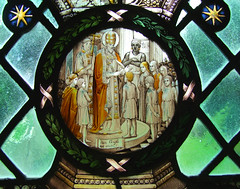 |
|
Barnham church sits in north
Suffolk halfway between Euston and
Elveden, two villages with churches that
are much more famous, and also much more
locked. St Gregory, on the other hand, is
open to pilgrims and strangers every day.
There were once two churches in Barnham,
but St Martin has been a ruin for almost
half a millennium, though you can still
find part of the overgrown tower in a
nearby garden. Barnham was the place that
the Liberties of St Edmund and Thetford
met, and there was one parish in each
Liberty. I have to confess
that on an earlier version of this entry
I described Barnham church as dull. My
only defence is that I didn't know what I
was talking about. Unfortunately for
Barnham, it has taken me seventeen years
to come back here, and about seventeen
seconds to realise that I was quite
wrong. This is a lovely little church,
full of simple light and colour.
Externally it looks all of an Early
English piece, and if this is largely due
to the 19th Century restoration then
never mind, for it is most harmonious.
Only a fool could think it dull.
|
Stepping
inside, you realise that the church was extended
northwards by the Victorians, with the addition
of not just a north aisle but a north transept
too. All this is hidden from the road. In the
south wall of the nave and in the east window of
the chancel are two wholly excellent windows by
AK Nicholson. The nave window depicts St
Augustine and St Genevieve (she is the patron
Saint of Euston church, and we are on the Duke of
Grafton's Euston estate here). Below the two main
figures are two pretty roundels, one with St
Augustine blessing the English slave children in
Rome, and the other of St Germanus baptising the
young St Genevieve, with a curious misspelling in
the legend.
 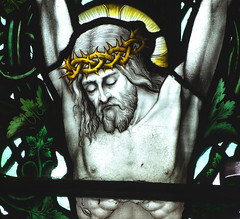 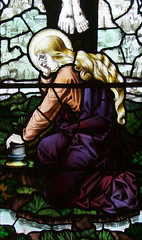 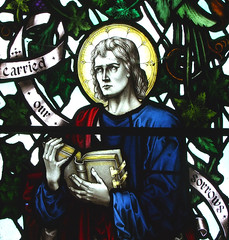
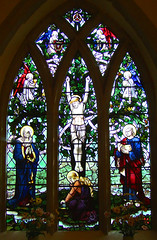 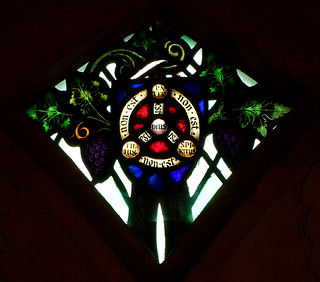 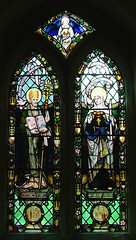
The
two windows are different enough in style to show
they probably came from two different periods,
the east window before the First World War and
the nave window later, perhaps as late as the
1930s. As lovely as the east window is, the real
star of the show in the chancel is the elegant
piscina, which Pevsner thought late 13th Century,
and so this and the contemporary font probably
suggest a date for the rest of the church before
the Graftons restored it. From a quite different
era comes a royal arms for William III.
| In the north transept there
is a replica of the village war memorial
with nineteen names on it, a reminder of
quite how many people worked on these
estates in the days before technological
modernisation. But to the west, on the
north wall of the aisle, is something
quite different and really rather
wonderful. It is a collage which builds
up, house by house, a map of Barnham as
it was at the 1911 census. The houses are
named, the people named, and those soon
to head off to the horror of France and
beyond are shown too, proud in their new
uniforms. It is a remarkable work, and
deserves to be better known. Sixty
years earlier, at the 1851 census,
Barnham had a population of a little over
four hundred, and almost half of them
attended church on the day of the Census
of Religious Worship that year, a
remarkably high percentage for an East
Anglian parish, especially given that
there was a primitive methodist chapel in
the village as well. Perhaps the
influence of the Dukes of Grafton had
something to do with it.
|
|
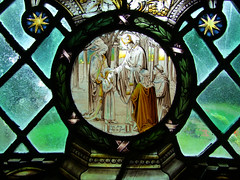 |
|
|
|

